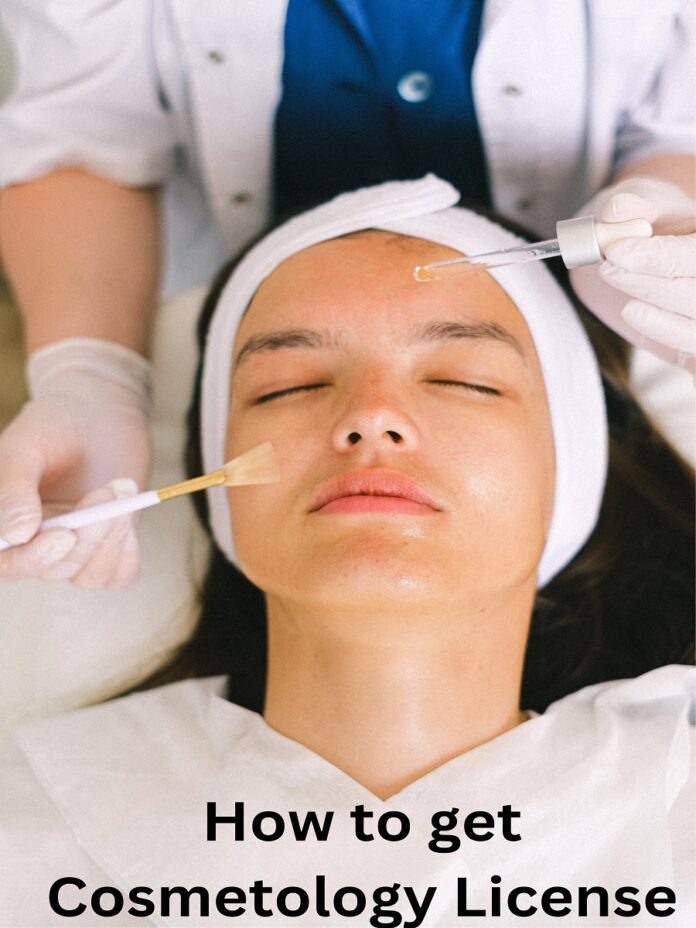Are you interested in beauty treatments and want to turn your interest into a rewarding career? Take a look at the exciting world of cosmetology! Cosmetology is an ever-evolving industry that has become an essential part of modern society, ranging from hair styling to skincare, nail care, and makeup application. Professional cosmetologists are in high demand, with numerous opportunities for advancement and success.
But here’s the catch: in order to turn your passion for beauty treatments into a lucrative career, you’ll need to obtain a cosmetology license. That’s right, getting a cosmetology license is a must for anyone who wants to work professionally in the industry. Specific education and examination requirements must be met depending on the state before you can apply for your license. It is critical to fully comprehend these requirements in order to prepare for a successful career in the exciting field of cosmetology.
Navigating the world of cosmetology licenses and requirements may appear daunting at first. But don’t worry! Obtaining your cosmetology license can be a breeze with the right guidance and resources. So, whether you’re just getting started or looking to advance your career, we’re here to help you every step of the way. With a cosmetology license in hand, you can unleash your full potential and take the beauty world by storm. Let’s get this party started!
Get cosmetology license
1. Education Requirements
Attending a cosmetology school, participating in an apprenticeship program, or taking online courses are all options for becoming a licensed cosmetologist. The most popular option is to attend a cosmetology school, where students can learn various beauty treatments and techniques under the supervision of licensed instructors. This method gives students hands-on experience and prepares them for the required licensure exams.
Apprenticeship programs, which involve working under the supervision of an experienced cosmetologist, are another option. This method is best suited for those who prefer to learn through hands-on experience and do not have the financial means to attend a formal cosmetology school. Depending on the state’s requirements, apprenticeship programs can last anywhere from six months to two years.
For those seeking a cosmetology license, online courses are another option. This method allows students to learn at their own pace and on their own time, making it a convenient option for those who have other responsibilities. However, online courses do not provide the hands-on experience that attending a cosmetology school or apprenticeship program does.
It is important to note that the educational requirements for obtaining a cosmetology license vary by state. Some states may require a certain number of training hours or the completion of an approved cosmetology program, whereas others may accept apprenticeship programs or online courses. As a result, it is critical to investigate and comprehend the specific educational requirements for the state in which one wishes to practice cosmetology.
2. Requirements for a License
There are several general requirements that must be met in order to obtain a cosmetology license in the United States. These requirements vary by state, but they generally include age restrictions, educational requirements, examination requirements, and other state-specific requirements.
Restrictions on Age
Depending on the state, age restrictions for obtaining a cosmetology license typically range from 16 to 18 years old. Applicants must have completed high school or have a GED certificate in most cases. In some states, applicants must also have a valid government-issued ID, such as a driver’s license or passport.
Educational Requirements
Completing a cosmetology program or apprenticeship program is typically required for obtaining a cosmetology license. Depending on the state, the number of hours required for cosmetology programs ranges from 1,000 to 2,100. Typically, apprenticeship programs require 1,500 to 2,000 hours of supervised work experience.
Examination Requirements
Written and practical exams are both required for obtaining a cosmetology license. The written exam covers theoretical cosmetology knowledge, while the practical exam assesses the applicant’s ability to perform various beauty treatments. The state board of cosmetology or a third-party organization usually administers the exams.
3. State Specific requirements
- Applicants in California must complete 1,600 hours of training in a state-approved cosmetology program and pass a written and practical exam. If they received their training outside of California, they must also provide proof of at least three years of licensed work experience within the last five years.
- In New York, applicants must complete a 1,000-hour cosmetology, barbering, aesthetics, or nail technology program, or a 1,200-hour natural hair styling program. In addition, they must pass a written and practical exam as well as a course on New York State laws and regulations.
- In Texas, applicants must complete either 1,500 hours of cosmetology training or 3,000 hours of apprenticeship training. In addition, they must pass a written and practical exam and show proof of liability insurance.
- In Florida, applicants must complete either 1,200 hours of cosmetology training or 2,000 hours of apprenticeship training. They must also pass a written and practical exam, as well as complete an HIV/AIDS course.
- In Illinois, applicants must complete either 1,500 hours of cosmetology training or 3,000 hours of apprenticeship training. They must also pass a written and practical exam as well as a law and regulations course.
- Georgia: Applicants must complete a 1,500-hour cosmetology, aesthetics, or nail technology program, or a 3,000-hour barbering program. In addition, they must pass a written and practical exam and show proof of liability insurance.
- Colorado: Applicants must complete a 1,500-hour cosmetology, aesthetics, or nail technology program, or a 2,000-hour barbering program. In addition, they must pass a written and practical exam as well as a course on state laws and regulations.
- Michigan: Applicants must complete a 1,500-hour cosmetology program or a 1,800-hour barbering program. In addition, they must pass a written and practical exam as well as a course on state laws and regulations.
- Oregon: Applicants must complete a cosmetology program of 2,300 hours or an aesthetics program of 1,200 hours. In addition, they must pass a written and practical exam as well as a course on health and safety regulations.
- Arizona: Applicants must complete a 1,600-hour cosmetology program or a 1,000-hour aesthetics or nail technology program. In addition, they must pass a written and practical exam as well as a course on state laws and regulations.
- Iowa: Applicants must have completed a 2,100-hour cosmetology or barbering program. In addition, they must pass a written and practical exam as well as a course on state laws and regulations.
- Virginia: Applicants must complete a 1,500-hour cosmetology program or a 1,000-hour aesthetics or nail technology program. In addition, they must pass a written and practical exam as well as a course on state laws and regulations.
- Pennsylvania: Applicants must have completed a 1,250-hour cosmetology or barbering program. In addition, they must pass a written and practical exam as well as a course on state laws and regulations.
- Utah: Applicants must complete a 1,600-hour cosmetology program or a 1,200-hour aesthetics or nail technology program. In addition, they must pass a written and practical exam as well as a course on state laws and regulations.
- Wisconsin: Applicants must complete a cosmetology program of 1,550 hours or a barbering program of 1,800 hours. In addition, they must pass a written and practical exam as well as a course on state laws and regulations.
4. How to get a cosmetology license without going to school?
If you want to get into cosmetology but don’t want to go to school, you might be wondering if it’s possible to get a cosmetology license without going to school. The good news is that it is possible in some states. There are, however, specific requirements you must meet in order to obtain your license without formal education.
So, how can you get a cosmetology license without going to school? Let’s look at some of the states where this is an option, as well as the requirements you’ll need to meet.
- In California, for example, you can get a cosmetology license without going to school if you have at least 3,200 hours of work experience as a registered apprentice or if you have at least 2,000 hours of work experience as a licensed cosmetologist in another state. The California Board of Barbering and Cosmetology will also give you written and practical tests that you have to pass.
- In Florida, you can also get a license to do cosmetology without going to school. To qualify, you must have worked as a registered apprentice for at least 2,000 hours or as a licensed cosmetologist in another state for at least 4,000 hours. The Florida Board of Cosmetology will also give you a written test and a practical test.
- In Texas, you can apply for a cosmetology license without going to school if you have at least 4,000 hours of work experience as a registered apprentice or 3,000 hours of work experience as a licensed cosmetologist in another state. The Texas Department of Licensing and Regulation will also give you a written test and a practical test.
- In Arizona, people can get a cosmetology license without going to school for it if they work as an apprentice for a licensed cosmetologist. A minimum of 2,000 hours of supervised training and a passing score on the state board exam are needed for the apprenticeship.
- In Maine, people can get a license to do cosmetology without going to school if they complete an apprenticeship program. A minimum of 2,000 hours of supervised training and a passing score on the state board exam are needed for the apprenticeship.
- In Virginia, people can get a cosmetology license without going to school if they have worked as a licensed cosmetologist in another state or country for at least two years. Applicants must pass the Virginia cosmetology licensing exam and meet other state requirements.
It’s important to note that these requirements are subject to change, so always check with your state’s Board of Cosmetology for the most recent information. While obtaining a cosmetology license without attending school may appear to be an appealing option, keep in mind that formal schooling can provide valuable knowledge and skills that can set you up for a long-term successful career.
5. Career Possibilities
You would work with clients to cut, style, and color their hair as a hair stylist. You could work in a salon or barbershop, or you could be self-employed and work from home. Hair stylist salaries vary depending on location and experience, but on average, hair stylists earn between $30,000 and $50,000 per year.
As a makeup artist, you would use your talents to enhance your clients’ natural beauty. You could work with clients on special occasions such as weddings or photo shoots, or you could work in the entertainment industry. Makeup artists’ salaries can vary greatly depending on location and experience, but on average, makeup artists earn between $30,000 and $60,000 per year.
You would work with clients to improve the health and appearance of their skin as an esthetician. You could provide a variety of services, such as facials, waxing, and body treatments. You could work in a spa or salon, or you could be self-employed and operate from your own studio. Esthetician salaries vary depending on location and experience, but on average, estheticians earn between $30,000 and $50,000 per year.
As a nail technician, you would provide manicures and pedicures to clients. You could also provide additional services such as nail extensions and nail art. You could work in a salon or spa, or you could be self-employed and operate from your own studio. Nail technicians’ salaries vary depending on location and experience, but on average, they earn between $20,000 and $40,000 per year.
Aside from these specific career paths, licensed cosmetologists can also work in other areas such as beauty product sales, salon management, or education. Salons, spas, beauty supply stores, and freelance work are all possible work environments for licensed cosmetologists.
Start your own Cosmetology Business
Starting a cosmetology business can be a difficult but rewarding endeavor. One critical step in the process of obtaining your cosmetology license and establishing your business is developing a comprehensive business plan. At Startup Stunners, we specialize in providing professional and high-quality business plan writing services that are tailored to your cosmetology business’s specific needs.

Our experienced writers will collaborate with you to create a customized business plan that details your objectives, strategies, and financial projections. You can be confident that your business plan will be well-crafted and comprehensive, giving you the confidence you need to launch and grow your cosmetology business, thanks to our expertise and attention to detail. Don’t let the difficulties of writing a business plan prevent you from pursuing your dream. Contact Startup Stunners today to begin your journey to success!
Conclusion
Finally, obtaining a cosmetology license is a must for anyone interested in a career in the beauty industry. While attending a cosmetology school is the most traditional way to complete the educational requirements, there are other options, such as apprenticeship programs and online courses. It is critical to research your state’s specific requirements, as they may differ slightly.
In conclusion, while attending a cosmetology school is the most common way to obtain a cosmetology license, there are other options for those who want to pursue this career without attending school. Becoming a licensed cosmetologist can be a rewarding and lucrative career choice if you meet the educational and examination requirements and take advantage of the various career opportunities available.
Frequently Asked Questions
b. What are the requirements for obtaining a license in cosmetology? State requirements vary, but in general, you must be at least 16 or 17 years old, have a high school diploma or equivalent, and have completed a state-approved cosmetology program or apprenticeship. To demonstrate your knowledge and skills in cosmetology, you must also pass both a written and practical exam.
c. Is a high school diploma required for cosmetology school? The majority of cosmetology schools require a high school diploma or an equivalent, such as a GED. However, if you are currently enrolled in high school and on track to graduate, some schools may allow you to enrol. It is always a good idea to check with the specific school you want to attend for their specific requirements.
d. When can you begin cosmetology school? The minimum age to begin cosmetology school varies by state, but in general, you must be at least 16 or 17 years old. If you are under the age of 16, but have parental consent, some states may allow you to enrol. It is always a good idea to check with the specific school you want to attend and your state board of cosmetology for their age requirements.






